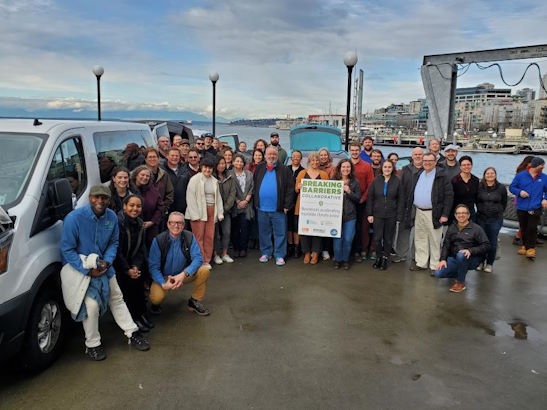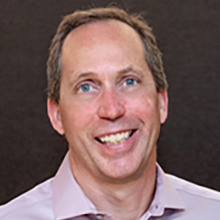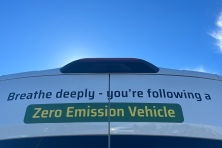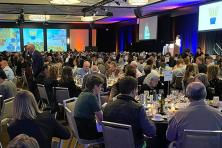2024 is off to a rapid start on climate action in the Pacific Northwest, filled with incredible stories of success and also some of the most significant threats to our progress in recent memory.
One of my favorite stories is the effort in the Ports of Seattle and Tacoma to address pollution from short-haul trucking. Diesel pollution from these trucks creates air pollution and health hazards for the people living near ports and are a major contributor to climate change.
Climate Solutions, along with many other organizations, has been working for several years on how to clean up these trucks. In late January, the Northwest Seaport Alliance announced that it has received a total of $15 million from both Washington State’s Climate Commitment Act (CCA) and President Biden’s Inflation Reduction Act in grants. The Ports can now move forward with rapid electrification for short-haul trucks. There are currently about 4,500 diesel trucks operating in these two ports so transitioning to 100% clean vehicles will have a huge impact on the air – for the truck drivers, the communities, and the climate.
You can hear similar stories in Oregon, with the first all-electric semi trucks and garbage trucks recently replacing their diesel counterparts in local communities. These vehicles joined the growing fleets of electric school buses, transit buses, and delivery trucks on Oregon roads – and even an electric tractor prototype on a local farm.
Another great story you should hear about is how Northwest businesses are figuring out how to transition powering their vehicle fleets from gasoline to electricity. More than a year ago Climate Solutions and four partners—the Washington Build Back Black Alliance, Clean and Prosperous Institute, Oregon Business for Climate Action, and the Wave Foundation—launched the Breaking Barriers Collaborative (BBC). The purpose of the program is to support businesses, organizations, and agencies that want to do more on climate and need support to do it.
The first cohort last year included a range of businesses wanting to flip their fleets, from AAA Washington to Oregon Dept. of Transportation to a local food truck. Last month the second cohort of the BBC Fleet Decarbonization Accelerator got underway. This cohort includes 18 different organizations including Boeing, Skanska, Bellevue College, Oregon Metro, and the Seattle Aquarium. Together they are learning the pathway to electrification for their combined fleets of nearly 10,000 vehicles. It is a truly inspiring group working hard to make a difference and learn from each other.
It’s news like this that underscores how Washington and Oregon are at the front of the pack with climate leadership. You can be proud of our region passing incredible “gold standard” policies over the last few years. From Washington’s Climate Commitment Act (CCA), Seattle and Oregon’s work on climate friendly buildings, and both states’ leadership on 100% Clean Electricity and Clean Fuels, the Pacific Northwest is setting the bar high for other states.
These many policies, coupled with the billions of dollars of investments flowing into equitable climate solutions from the Climate Commitment Act and several federal policies, are seeding real progress throughout the region.
Unfortunately, 2024 is also a year full of peril to this progress. Progress brings out those against the clean energy transition to fight it every step of the way and we see that in real threats this year.
Despite the fact that Washington State is now allocating billions toward meaningful climate solutions using revenue from the Climate Commitment Act, a conservative mega donor has essentially solo-funded a ballot measure aimed at repealing the law. The fate of this measure will be determined by Washington voters in the upcoming November election.
In Oregon, a state court has stopped the groundbreaking Climate Protection Program (CPP) due to a lawsuit brought by NW Natural Gas and other major polluters on a technicality, now requiring more rulemaking process to reinstate the program. The State designed the CPP to dramatically reduce climate pollution from the largest sources of pollution, and to generate hundreds of millions of dollars to invest in solutions.
Climate Solutions and our many allies are going to do everything that we can to defend our region’s leading climate policies and make sure that they result in doing what they are intended to do—cut climate pollution and invest in equitable solutions across Washington and Oregon. Winning these campaigns will require a mobilization of diverse coalitions and grassroots energy unlike anything we have seen.
This year holds significant work ahead, and you are needed—whether through your voice, time, or support.
The first step is hearing more from you, as a supporter. Could you take a few minutes to fill out this short survey?
Nearly every day I run into somebody or read a news story telling me an inspiring story of clean energy solutions working all around us. I am truly excited, and ready to protect our progress here in the Northwest.
Thanks for all that you do and here’s to a big year ahead.
p.s. Hope you can make it to our annual Seattle celebration event – back at the Westin Hotel in late May with an inspirational keynote speaker! More coming soon.
p.p.s. Here are some additional links and resources, if you are interested in learning more about some of the many solutions and climate action happening here in the Northwest:
- The Breaking Barriers Collaborative — Breaking Barriers Collaborative
- Oregon Court of Appeals finds state carbon reduction rules invalid - OPB
- Washington state now has the nation's most ambitious climate policy (volts.wtf)
- Projects funded by Washington’s Climate Commitment Act
- Projects funded by federal policies including the Inflation Reduction Act and the Infrastructure Investment and Jobs Act.





